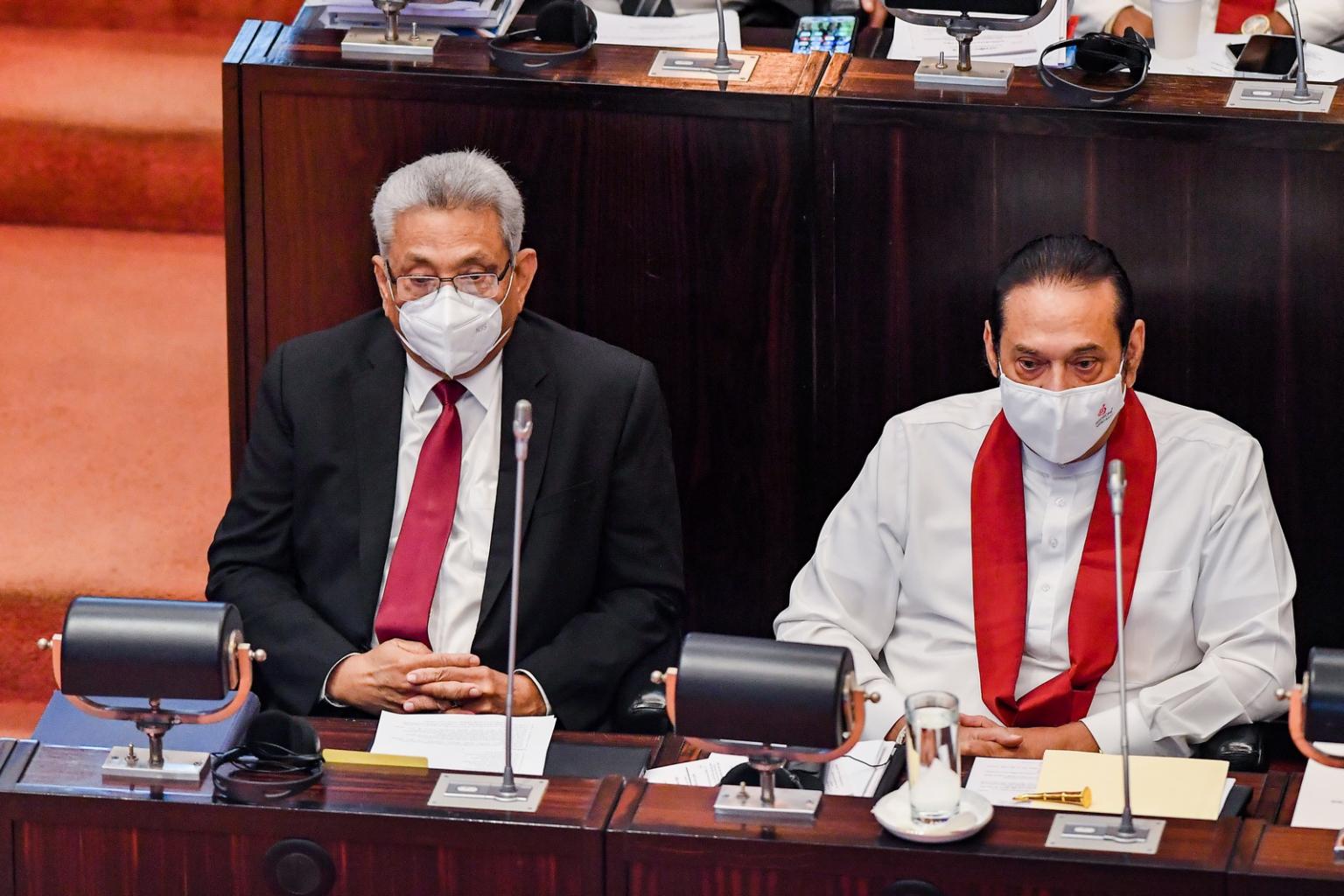Sri Lankan opposition to file motion to scrap president's powers
Sign up now: Get insights on Asia's fast-moving developments

Sri Lankan President Gotabaya Rajapaksa (left) and Prime minister Mahinda Rajapaksa, attend a session at the Parliament in Colombo, Sri Lanka, on April 7, 2022.
PHOTO: SRI LANKAN PRESIDENT MEDIA DIVISION/EPA-EFE
Follow topic:
COLOMBO (BLOOMBERG) - Sri Lanka's opposition plans to file a motion soon to abolish President Gotabaya Rajapaksa's sweeping executive powers that lawmakers and critics say has contributed to the economic mismanagement of the country and prompted street protests calling for his ouster.
"It will be an opposition motion. It will be to abolish the executive presidency," Mr Harsha de Silva, a lawmaker for the main opposition Samagi Jana Balawegaya party, told Bloomberg News.
"It is likely to go beyond the 19th amendment," he added, referring to an earlier constitutional change that curtailed the president's power.
Mr de Silva was echoing earlier calls from lawmakers that the presidency's executive powers should be abolished at the earliest.
Mr Rajapaksa has remained defiant and his supporters in Parliament have said he will not step down under any circumstances.
He won the presidency by a landslide in November 2019 on the back of a campaign to enhance security after the Easter Sunday attacks the same year.
He moved swiftly to amend the constitution a few months later to bestow more powers to his presidency including holding ministries, sacking ministers and controlling the election commission, police and anti-corruption agency.
In the past week, over 40 lawmakers abandoned his coalition and left it as a minority. Members of Parliament from both sides of the aisle have been reluctant to work with a bare-bones interim government, hastily formed after entire Cabinet resigned earlier in the week.
Their chief concern was that Mr Rajapaksa would override Cabinet decisions.
Foreign Minister G.L. Peiris met with the diplomatic corps earlier in the week, saying the current government still held a majority in Parliament and there was no consensus yet on who can replace the president and the prime minister.
There were constitutional provisions that include the prime minister taking over for 60 days if the president resigns and the lawmakers will then have to elect a suitable leader to head the country for the remaining period, Mr Peiris said in remarks published by the Foreign Ministry.
He denied that protesters were against the government, saying they displayed contempt and hatred for the parliamentary system and wanted all the lawmakers to resign. The protests were an "expression of despair", he added.
Mr Rajapaksa used his powers on Wednesday (April 6) to set up a new panel of fiscal experts and bureaucrats to advise him on the debt crisis and economic matters, especially ahead of planned talks with International Monetary Fund as early as next week on financial aid.
On Thursday, he had sworn Mr Nandalal Weerasinghe, a career central banker, to head the monetary authority.
The Central Bank of Sri Lanka is due to announce its interest rate decision later Friday, with economists expecting a full percentage point hike each in benchmark deposit and lending rates.
They expect another 2 percentage-point increase in borrowing costs before October, in an attempt to temper demand and cool soaring inflation.
The country's crippling inflation, Asia's fastest, has sent the cost of basic goods skyrocketing, and its people are bearing the brunt of it - having to line up in long queues for gasoline amid a shortage and face power cuts for up to 13 hours a day.
Mr Rajapaksa repealed a five-day-old emergency order as crowds of protesters defied the proclamation that had given him sweeping powers to detain people in favour of a less heavy-handed approach.
Protests have largely been peaceful although there have been reports of police firing tear gas and water cannons against crowds in Colombo over the past week.

